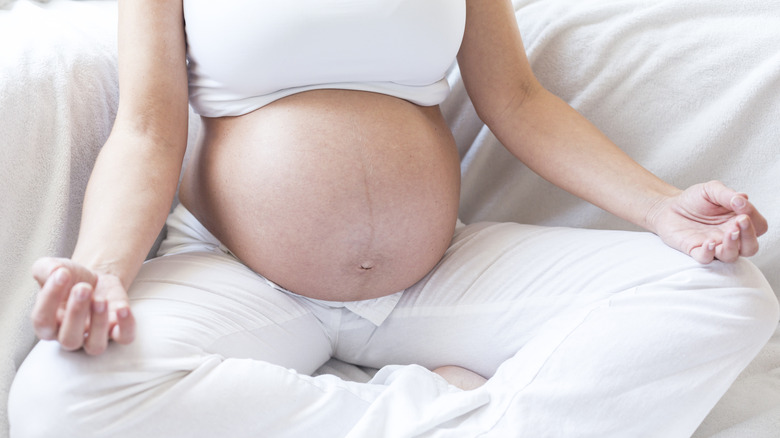7 Pieces Of Advice You Should Listen To While Pregnant And 7 You Shouldn't
We may receive a commission on purchases made from links.
Have you ever heard some of the crazy advice pregnant women used to receive? Enjoy a cigarette to help you and baby relax, or wear a corset to hide that unsightly growing belly! If women in the past were receiving whacked-out tips like these, it really makes you wonder how much advice can really be believed?
A good rule of thumb is to make sure you check out the sources of any information that comes your way. Can your friend point to any evidence that sleeping on your side makes the baby come out squashed? Not likely. So in the interest of figuring out what advice you really should listen to while pregnant (and the stuff you shouldn't), I spoke with trusted midwife, Catherine Bailey, CPM, LDM, of Unfurling Birth and Midwifery Services. Her sage guidance — combined with my reading up on evidence-based research — lead to this list of seven bits of pregnancy advice you should take to heart, and seven that you might as well laugh off.
Shouldn't: Don't get excited in the first trimester
This one makes me a bit sad because I remember receiving this advice and thinking, "Um, too late! Not helpful!" The thinking behind this one is that the risk for miscarriage is highest in the first trimester, so you should try not to get too attached to the idea of your little zygote turning into a baby. Not only do I think this is unhelpful advice (seriously, how could you be expected to just turn off your emotions?), but also science backs me up.
First of all, yes, miscarriage is at its most likely in the first trimester, but is it overall likely that you'll miscarry? No. A recent Parents article cited Dr. Karyn Morse, an ob-gyn at Cedars-Sinai hospital in Los Angeles, saying fewer than 20 percent of all pregnancies result in a miscarriage. That entire remaining 80 percent produces live births.
So it's not exactly uncommon, but is miscarriage a likely event? Nope. And after you first hear the heartbeat at the doctor or midwife's office (usually around six to eight weeks), the article reports, "The risk of miscarriage drops to about five percent." The risk is real, but it's also very small. One helpful thing someone told me when I was filled with early pregnancy miscarriage anxiety is that you're the product of a long line of successful pregnancies. Remember that.
Shouldn't: Don't have wine/sushi/lunch meat
Conflicting opinions abound on what pregnant women should, and shouldn't, imbibe. Fetal alcohol syndrome is a very real consequence of heavy "alcohol exposure in utero." That said, recent studies have shown that a small amount is likely fine. Scientific American reported just that, citing a surprising recent study in an article titled, "A Daily Glass of Wine Is Okay During Pregnancy."
So a little might be fine, and a lot is definitely bad. But scientists just don't know exactly what an "acceptable" amount of alcohol might be, so The American Academy of Pediatrics currently states, "No amount of alcohol intake should be considered safe," though not every nation is so conservative. In Bulgaria, for instance, recommendations are that a pregnant woman "may consume no more than one glass of wine or beer or 25 milliliters of spirits once a week." Mixed messages? Yep.
And what about more subjective ingestibles, like sushi, lunch meat, or coffee? Bailey says it's a personal choice, and reminds patients that, "no one in Japan stops eating sushi in pregnancy, [though] there is always some risk to consuming raw fish and that risk doesn't change." She does suggest limiting tuna intake to lessen mercury exposure. And as for lunch meats, she said, "If you can find nitrite/nitrate-free lunch meat... enjoy it!" As for the risk of Listeria, a foodborne bacteria that can be carried by lunch meat, it's something to consider, but is very rare.
Shouldn't: Exercise will hurt the baby
"No grandma, my uterus won't fall out if I go for a jog." That's what you should say if you're expecting and your grandma, neighbor, co-worker, or lady on the treadmill next to you unhelpfully advises that you need bed rest for a normal pregnancy. Moderate exercise is absolutely not considered a pregnancy no-no in modern medicine.
In my interview with knowledgeable and friendly neighborhood midwife Catherine Bailey, she said she definitely recommends "daily exercise" during pregnancy. "Regular movement in pregnancy can make the labor and birth go more smoothly," Bailey told me. "Walking, hiking, yoga, swimming, dancing...whatever you enjoy." As for any particularly helpful moves, Bailey mentioned that "squatting as often as possible in pregnancy" can really prepare you for the big day. Unless your care provider specifically tells you not to, you should keep exercising throughout a normal pregnancy.
Shouldn't: Get rid of animals before baby arrives
Good news for animal lovers: the old fashioned thinking that cats will "suck a baby's breath away," or little Rover will go berserk and attack the infant, or even that pets are too dirty to have in the same house as Junior — is just the stuff of old wives tales. A recent article on the subject at Womenshealthcaretopics.com says that "taking your little 'fur baby' to the pound is not necessary."
But what precautions should you take with your pets during pregnancy? The article, which was reviewed by Dr. James W. Brann, M.D., author of The Most Common Pregnancy Concerns Explained, states that you should consider obedience training for larger dogs who might playfully or accidentally assert their size around you, or your future kid.
And what about kitty? Doctor's orders will probably include taking a nine month break from being the one to scoop the litter. According to the article, "The main concern of having cats in the house when you're pregnant is toxoplasmosis, a parasitic infection that can cause mild or severe birth defects, stillbirth, and miscarriage." But you won't get this dangerous disease simply from scratching your pet behind the ears. It's generally only "passed through feces." So just have a partner or friend scoop the litter box.
Shouldn't: Stop all medications
This one is tricky, but the most accurate answer is no, you don't automatically need to stop all medications. As Bailey put it, "This is a hard question to answer because there are so many medications out there and their safety in pregnancy varies so much." And the truth is that the precise effect of most medications in pregnancy simply isn't known.
According to the CDC, the use of some medications during pregnancy will likely cause birth defects. But there are certainly some, both over-the-counter and prescription, that are widely considered okay in pregnancy. The FDA once used a letter rating system for medicines in pregnancy, (which I remember being rather vague), but they are currently working on a more realistic and accessible way to get information about the safety of different drugs into the hands of preggo moms.
Bailey also went on to say: "I recommend that all pregnant women who are taking any medication...consult with their primary care provider about that particular medicine in pregnancy...For some women the risk of going off their medication is worse than the potential risk to the fetus and that is a hard but real conversation to have with your loved ones, your therapist, and your care provider." As Bailey said — and my doctor told me when I was pregnant — it's always going to be a risk/benefit analysis.
Shouldn't: You're too small for a vaginal birth
Bailey said she hates to hear that women have been told they're "too small have a vaginal birth," since she says it's unlikely. She explained that sometimes when a mom-to-be is a rather small person, or the partner or sperm donor is a much bigger person than the mother, or the woman is just worried about having a smaller vagina, that the problem is often overstated.
"Almost every time, women's bodies make babies that they can fit out of their bodies," Bailey assured me. "Also, having a small vagina/tight vaginal muscles means almost nothing about how you will give birth. The hormones of labor and birth are such that those tissues will feel completely different than any other time. Women's bodies are made to give birth and there's no reason to assume that you can't do it!" So if you're told your size makes vaginal birth impossible, you might consider getting a second opinion.
Shouldn't: Relax and enjoy the weeks before birth
Ah, another piece of probably well-meaning but unfortunately unhelpful common advice. In the final couple weeks before delivery, it's common for mothers to be so uncomfortable that they become obsessed with getting that baby out of there! Or maybe you are filled with anxiety about the pain and potential complications of birth. Or maybe you're a bit scared of the transition into motherhood, or the transition to multiple children.
Whatever your reason, it's quite common for very pregnant women to be on edge right before delivery. And someone telling you to "just relax and enjoy it" isn't going to help. As Sue Shellenbarger recently wrote in the Wall Street Journal, "When someone is getting stressed out, one of the least effective (and perhaps most annoying) things to say is 'Relax.' The directive has exactly the opposite effect on most people."
No kidding. If someone says that to you while you're straight tripping during late pregnancy, maybe you could suggest something they could do if they really want to help you relax, like doing chores for you, or gifting you with a prenatal massage!
Should: Plan for postpartum, not just the birth
The birth of your baby, any way it happens, will likely be an experience you'll remember, for life. That said, many new mothers-to-be get caught up in planning for this intimidating event that will, in the end, probably not take very long in the scheme of things. But you know what will go on and on? Taking care of that baby, and yourself, and maybe your partner during a time when things can get challenging.
As Bailey put it to me during our interview, "The big thing to plan for is the postpartum period! Have you taken a breastfeeding class? A parenting class? A baby wearing class? Have you planned financially and logistically...?" It's very useful to go into the postpartum period with a plan, even if you don't exactly stick to it. Knowing who your support people will be, how you plan to feed the baby, where the baby will sleep, housework, cooking, whether or when you or your partner will go back to work...This kind of thing is best worked out before you're operating on zero sleep.
Should: Take a prenatal vitamin with folate
You probably already know that taking a prenatal vitamin is generally good advice. But not every vitamin is created equal. So make sure you choose a vitamin made specifically for pregnant women, that includes the recommended amounts of folic acid, iron, calcium, vitamin A, vitamin B12, and vitamin D during pregnancy, according to Womenshealth.gov, as too much or too little can have adverse effects.
As for Bailey's professional advice, "Taking prenatal vitamins for three months before pregnancy and throughout pregnancy and breastfeeding is a great addition to eating well," she told me. She also added that she advises her patients to "make sure the folic acid is in the 'folate' form and not 'folic acid' on the label. Newer research suggests that folic acid in that form can lead to midline defects in the fetus, like tongue ties." There's always something new to learn.
Should: Do kegels and pelvic floor exercises
If you've never been pregnant or had a vaginal or uterine health issue before, you may not have ever even thought about your pelvic floor. But that will definitely change in pregnancy. As Womenshealth.gov puts it, your pelvic floor is a system of muscles that "support the rectum, vagina, and urethra in the pelvis." So a strong pelvic floor will not only help you push the baby out if you deliver it vaginally, but will also be pivotal in your postpartum recovery.
Bailey also specifically mentioned that "kegels can be really helpful for healing the pelvic floor after birth," after you feel ready to do them, of course. But doing them both during and after pregnancy is the best way to get the full benefits. You can find an easy description of how to do kegels here. They're not the only option, however. There are many different ways to strengthen the pelvic floor muscles. You can even learn specific yoga practices to strengthen that area.
Should: Make an open-minded birth plan
It's a good idea to write (and make copies of) a birth plan. This is — in addition to knowing in your head how you hope the particulars of your birth will go — a written directive that you can share with your doctor, midwife, nurses, etc., to let them know what your wishes are regarding the circumstances of labor and delivery. Like, are you planning to use pain medication? Do you want to avoid an episiotomy if at all possible? You can get a sample template of your birth plan from lots of good spots online, like MarchofDimes.org, or sometimes from your hospital or birthing center.
But a birth plan is just that — a plan. And we all know things don't always go according to plan, so it's important to remember that even if things don't go exactly how you expect, you can still come out the other side with a positive experience. You should try to "go into the birth with an open mind," as Bailey finds it important to tell clients. "From my experience, people can feel traumatized by their birth if it doesn't meet their expectations....let go of all your expectations about your birth! Birth is so unpredictable and people tend to have better experiences of it when they aren't too attached to a particular outcome. " Of course this doesn't mean you can't design your ideal birth, just be prepared for plans to evolve with any unexpected occurrences.
Should: Don't feel bad about acting extra sensitive
Are you crying at things that previously wouldn't have given you pause? Getting insanely annoyed at every little thing your partner does? You're not alone, and you shouldn't feel bad for going through a period of enhanced sensitivity and emotion. Especially if this is your first time being pregnant, your body is dealing with hormones it's never encountered before.
In fact, Bailey stressed that "the hormones of pregnancy are equivalent to taking about 100 birth control pills per day! There is so much going on in your body that is out of your control right now and it makes sense that you are feeling this way." Not that this emotional surge is an excuse for treating people around you badly, of course. But you — and those around you — should cut yourself a well-deserved break.
Should: Take a babymoon if you can manage it
A "babymoon" is a "pre-baby vacation," or a trip that you and your partner take together prior to your baby coming into your lives. It's a chance for you and your partner to get away and relax together for a sort of "last hurrah" of travel and chilling before your lives, family, and priorities fully make that major shift that will come along with the baby. Many couples also use this as a chance to talk over their relationship, making sure it's strong for the challenge ahead, and to discuss their hopes and plans for their upcoming huge life change. I've personally known couples that went on babymoons and really relished what the experience did for them.
Do you need to go on a babymoon? No way. Especially if you're already short on time and money, don't feel like you have to overextend yourself. But if you can manage it, the experience can be helpful. And doctors writing for publications as varied as WebMD and Fox News Health agree that as long as you pay attention to general pregnancy travel recommendations, like ideally restricting plane travel to sometime around the second trimester, and avoiding places known for particular diseases (like Zika or West Nile virus), that you should feel good about going.
Should: Remember that you're in charge
Every culture has different customs and advice for pregnant women. There is so much conflicting information and evidence out there that even in the U.S., there is hardly such a thing as a medical or cultural consensus about everything you should and shouldn't do in pregnancy. Notably, Jezebel published a post rather comedically listing some of the most exasperatingly conflicting advice and evidence out there.
So what's a mom-to-be to do? Everyone will handle these difficult decisions differently, but the most important thing is to remember that you get to make the final decisions because it's your body and your baby. It's important to read and listen to the sources that you trust, and then do what you and yours decide is best in your case. You got this.














